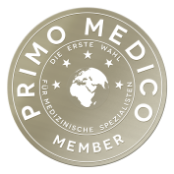Minimally Invasive Oncological Surgery Essen: Univ.-Prof. Dr Andreas Rink
Treatment focus
- Minimally invasive surgery of the colon and rectal tumors (colon carcinoma, rectal carcinoma)
- Minimally invasive surgery of esophageal and gastric tumors (esophageal carcinoma, gastric carcinoma)
- Minimally invasive surgery of liver tumors
- Surgical treatment of tumor manifestations in the peritoneum (peritoneal carcinomatosis)
Contact
University Hospital Essen
Hospital for General, Visceral and Transplant Surgery
Hufelandstr. 55, D-45147 Essen
P: +49 201 7199 9140 F: +49 201 723 5946
Consultation Hours:
Tuesday 8:30 AM – 1:00 PM
We are available by phone:
Monday - Friday 8:30 AM - 3:00 PM

Medical Range
Range of Diagnostic Services
- Sonography
- Endosonography
- Computed tomography
- Magnetic resonance imaging
- PET-CT
- Diagnostic laparoscopy
- Intraoperative sonography
- Endoscopy
Range of Therapeutic Services
Surgical treatment of:
- Large intestine tumors (colon carcinomas)
- Rectal tumors (rectal carcinomas)
- Tumors of the esophagus (esophageal carcinomas)
- Tumors of the stomach (stomach carcinomas)
- Tumors of the liver
- Chronic inflammatory bowel diseases (Crohn's disease, ulcerative colitis)
- Tumors of the pancreas (pancreatic carcinomas)
- Tumor manifestations in the peritoneum (peritoneal carcinoses)
- Hereditary tumor diseases (Lynch syndrome, HNPCC, familial adenomatous polyposis)
More Information
Card
Professor Dr Andreas Rink is a specialist in minimally invasive tumor surgery with a particular focus on treating colon and rectal tumors (colon carcinoma, rectal carcinoma), gastric and esophageal tumors (gastric carcinoma and esophageal carcinoma), and those of the liver and pancreas. He is the head of the minimally invasive oncological surgery section of the hospital for general, visceral, and transplant surgery at the University Hospital Essen. In addition, he is a specialist in surgery, special visceral surgery, coloproctology, and surgical oncology.
Professor Rink and his team have made it their mission to achieve radical tumor removal with maximum sparing of the surrounding healthy tissue and under minimal stress to the body. This is achieved by using high-resolution cameras, the most subtle dissecting instruments, and surgical robots to apply various minimally invasive precision surgery techniques, ensuring optimal functional preservation and rapid recovery.
Expert in Minimally Invasive Tumor Surgery
For most tumors of the digestive organs, correctly carried out surgical removal is the decisive step for the healing of the disease. In addition, these interventions can increasingly be carried out minimally invasively, also known as keyhole surgeries. This involves making only a few millimeter-long incisions in the skin. The wide opening of the chest cavity or a complete abdominal incision is then no longer necessary.
Professor Dr Rink holds the professorship for minimally invasive oncological surgery at the Medical Faculty of the University of Duisburg-Essen. In addition to the surgery of tumors of the gastrointestinal tract, Professor Rink also focuses on tumors of the esophagus, liver, and pancreas and is engaged in tumor metastases in the peritoneum (peritoneal carcinomatosis). Furthermore, minimally invasive surgical procedures are sometimes used in complex interdisciplinary operations.
Minimally invasive surgery has various advantages, from the point of view of optimizing the chances of recovery and from the point of view of the patient's subjective perception of the stress caused by the surgery. The better cosmetic result is due to small scars that are often hardly visible after the procedure falls far into the background. Much more critical is the faster recovery due to less pain, faster onset of bowel activity, less blood loss, and the resulting consequence of getting healthy again quickly and thus shortening the duration of treatment in hospital.
The gentler surgical technique also has another advantage: The body's tumor defenses are less impaired by the surgery. The faster recovery means that any additional therapies that may be necessary can begin more quickly and may therefore be more effective. Overall, the duration of treatment is shortened if the stress caused by the surgery is low. In the case of many tumor diseases, current research findings suggest equally good and even better chances of recovery after minimally invasive surgery.
Specialist for Colorectal Cancer Surgery
Colorectal cancer is one of the most common cancers in Germany. More than 30% of tumors are located in the rectum and are referred to as rectal cancer. Therapeutically, surgery is of central importance, although radiation or drug treatment is also used in some cases. Tumor surgery on the rectum is called "total mesorectal excision" (TME). The rectum is removed in one "package" and its surrounding vascular and tissue structures. The surgery is challenging because there are many nerves and blood vessels in the surgical vessel that should be spared as much as possible.
Maintaining fecal continence and essential other functions of the surrounding organs, such as the bladder or the genitals, to maintain a good quality of life is of great importance to Professor Rink and his team. For this reason, Professor Rink and his team also operate on rectal tumors located close to the sphincter muscle in 80-90% of cases while preserving bowel continuity and continence. This is also achieved by using state-of-the-art minimally invasive surgical techniques, such as surgical robots (DaVinci system), transanal minimally invasive surgical procedures (TAMIS), and pelvic neuromonitoring to protect the nerve structures in the small pelvis. Rectal tumors are therefore almost exclusively operated on without a large abdominal incision.
The tumor can also be removed locally for tiny tumors at an early stage. This procedure can be performed minimally invasive transanal, which is very little stressful for the patient.
For colon tumors (colon carcinomas), minimally invasive surgical procedures are also used almost exclusively; the surgical robot (DaVinci system) is preferred for many tumor localizations. Similar to rectal tumors, the goal is to remove the tumor-bearing intestinal segment and the associated vascular and tissue structures. The surgery is referred to as complete mesocolic excision (CME). Tumor surgery of the colon, while preserving the rectum, has far less impact on bowel function than tumor surgery of the rectum. Therefore, the minimally invasive surgical technique primarily helps optimize safe tumor removal and minimize the stress of the procedure.
Minimally Invasive Surgery for Stomach and Esophageal Cancer
Early stomach tumors (gastric carcinomas) are primarily operated on; very early ones can sometimes be ablated during gastroscopy. Advanced gastric cancers are now usually treated with surgery and chemotherapy. However, complete removal of the tumor is a requirement for a cure, but the likelihood of this is increased by chemotherapy, which is usually administered before and after surgery.
Gastric carcinomas can also be operated on minimally invasively in most cases. Here, too, high-resolution cameras, fine dissection instruments, or surgical robots (DaVinci system) help remove the tumor entirely in the sense of a precision intervention while preserving all important surrounding structures and with minimal stress on the patient.
As with other minimally invasive surgeries, the technique speeds recovery and can shorten the length of hospital stay and the overall treatment time for the disease.
Minimally invasive surgical procedures are used almost exclusively for esophagus cancers (esophageal cancer). The esophagus is mainly localized in the thoracic cavity. In most cases, the tumor-bearing section of the esophagus, which must be removed along with the surrounding vascular and tissue structures, is replaced by the tubularly reshaped stomach. This implies that tumor surgery of the esophagus requires surgery in the abdominal and thoracic cavities. Several studies have shown that using minimally invasive surgical techniques reduces the risk of postoperative complications and presumably improves recovery chances. Using a minimally invasive approach, Professor Rink and his team operate on most esophageal cancers. This means that neither the abdominal cavity nor the chest cavity needs to be opened through a larger incision. A high-precision surgical robot (DaVinci system) is increasingly being used here as well.
Curriculum Vitae
| Since 08/01/2021 | Head of the Section of Minimally Invasive Oncological Surgery, Clinic for General, Visceral and Transplantation Surgery, University Hospital Essen (Director: Univ.-Prof. Dr U. Neumann) |
| 10/20/2021 – 01/02/2024 | Representative Director of the Hospital, Clinic for General, Visceral and Transplantation Surgery |
| 12/2020 | Appointed to the W2 Professorship for Minimally Invasive Oncological Surgery, University of Duisburg/Essen |
| 06/2020 – 07/2021 | Senior Physician, Head of Colorectal Surgery, Hospital for General, Visceral and Transplant Surgery, Mainz University Medical Center (Director: Univ.-Prof. Dr H. Lang) |
| 06/05/2020 | Appointed as Associate Professor at the Johannes Gutenberg-University, Mainz |
| 11/01/2019 | Part-time Position as "Senior Consultant" for Colorectal Surgery at the Department of General, Visceral and Transplant Surgery, University Medical Center Mainz (Director: Univ.-Prof. Dr H. Lang) |
| 10/02/2019 | European Board Exam in Surgical Oncology Surgical Oncology (EBSQ) |
| 11/14/2016 | Position on the List in the Appeals Procedure for the W2 Professorship for "Oncological Colorectal Surgery/Minimally Invasive Surgery and Robotics" at the University Medical Center Mainz. |
| 01/2013 – 06/2020 | Senior Physician in Charge, Hospital for General, Visceral and Thoracic Surgery, Klinikum Leverkusen (Director: Prof. Dr K.-H. Vestweber, since 01.06.2017 Prof. Dr N. Schäfer) |
| 04/2010 – 12/2012 | Head Physician of the Department of General and Visceral Surgery, Evangelical Hospital Cologne Weyertal |
| 09/252009 | European Board Examination in Coloproctology (EBSQ) |
| 05/07/2009 | Venia Legendi for Surgery Title of Habilitation Thesis: "New Aspects in Rectal Replacement |
| 12/2007 – 03/2010 | Senior Physician at the Hospital for General and Abdominal Surgery at the University Hospital Mainz (Director: Univ.-Prof. Dr med. H. Lang) |
| 16/02/2006 | Recognition as a Specialist in Visceral Surgery |
| 02/2003 – 11/2007 | Senior Physician at the Department of General Surgery, Leverkusen Hospital (Head Physician: Prof. Dr K.-H. Vestweber) |
| 10 – 11/2001 | "Postgraduate Teaching Term in Coloproctology" at St. Mark's Hospital & Academic Institute, Harrow, England |
| 03/01/2001 | Recognition as a Specialist in Surgery |
| 07/1994 – 01/2003 | Assistant Physician in the Department of General Surgery, Klinikum Leverkusen (Senior Physician in Charge: Prof. Dr K.-H. Vestweber) (Rotations to the Departments of Trauma Surgery (Senior Physician in Charge: Prof. Dr J. Ahlers) and Vascular Surgery (Senior Physician in Charge: Dr W. Päffgen) |
| 04/07/1995 | License to Practice Medicine |
| 11/17/1994 | Doctorate Title of the Thesis: "Clinical and Experimental Investigations on the Significance of Fibronectin as an Early Marker of Sepsis" (Supervisor of the Thesis: Prof. Dr M. Nagelschmidt) Rating: "Summa cum laude" |
| 01 – 06/1994 | Scientific Research at the Chair of Surgery, Dept. of Neurosurgery, University of Pennsylvania, Philadelphia, U.S.A. (Head: Prof. Dr T.K. McIntosh) |
| 12/01/1993 | Limited License to Practice Medicine |
| 11/18/1993 | Medical examination (Final Grade: A) |
| 1990 – 1993 | Doctoral Student in the Biochemical and Experimental Section of the II. Surgical Chair of the University of Cologne (Head: Prof. Dr E. Neugebauer) |
| 1986 – 1993 | Study of Human Medicine at the University of Cologne |
Transport Connections
| Essen Main Station | 2.5 km |
| Mühlheim Main Station | 9 km |
| Essen/Mühlheim Airport | 7 km |
| Düsseldorf Airport | 27 km |
| Dortmund Airport | 48 km |
Information about Essen
Essen is a city in the west of Germany, located in the middle of the Ruhr area. The fourth-largest city in the state of North Rhine-Westphalia is considered an important industrial and business location. Essen is located in the Rhine-Ruhr metropolitan region and was the European Capital of Culture in 2010.




